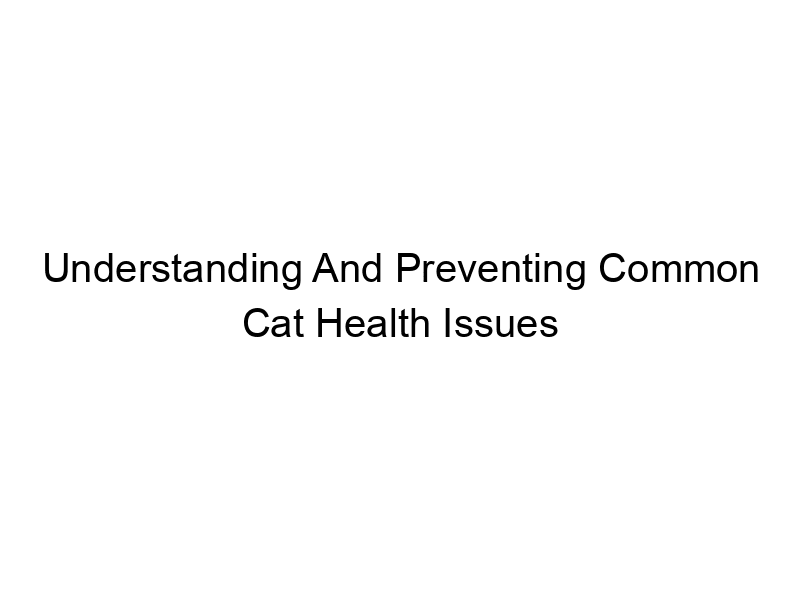Owning a cat is a rewarding experience, filled with purrs, cuddles, and endless entertainment. However, responsible pet ownership includes understanding and preventing common feline health problems. This comprehensive guide explores common cat health issues and how to prevent them, equipping you with the knowledge to keep your furry friend happy and healthy for years to come. You’ll learn about various ailments, their causes, symptoms, preventative measures, and when to seek veterinary care. We’ll cover everything from routine care to recognizing serious conditions.
Upper respiratory infections in cats are common viral or bacterial infections affecting the nose, throat, and sinuses. Symptoms include sneezing, coughing, nasal discharge, and eye discharge. Feline herpesvirus and calicivirus are the most frequent culprits.
Vaccination is crucial, especially for kittens. Maintaining a clean environment, minimizing stress, and avoiding contact
with infected cats are key preventative measures. Good nutrition strengthens the immune system, making your cat more resilient to infections.
Feline Leukemia Virus (FeLV)
Understanding FeLV
FeLV is a retrovirus that weakens a cat’s immune system, making them susceptible to various cancers and infections. It’s transmitted through saliva, nasal secretions, and blood. FeLV is a serious illness, often leading to a shortened lifespan if left untreated.
Preventing FeLV
Vaccination is the primary method of prevention. Keeping your cat indoors, avoiding contact with other cats, especially stray or feral ones, and regular veterinary check-ups are essential. Early diagnosis can improve the outcome.
Feline Immunodeficiency Virus (FIV)
What is FIV?
FIV is another retrovirus affecting cats, primarily transmitted through bites. It weakens the immune system, making them vulnerable to opportunistic infections. Unlike FeLV, FIV is not as easily transmitted and often progresses slowly.
Preventing FIV
Preventing FIV involves keeping your cat indoors, avoiding fights with other cats, and spaying or neutering to reduce aggressive behavior. There is no vaccine for FIV, emphasizing the importance of prevention.
Feline Infectious Peritonitis (FIP)
Understanding FIP
FIP is a fatal disease caused by a mutation of the feline coronavirus (FCoV). It exists in two forms: wet (fluid accumulation in the abdomen or chest) and dry (systemic inflammation). Early symptoms are often subtle, making diagnosis challenging.
Preventing FIP
Preventing FIP is challenging because there is no effective vaccine. Maintaining a clean environment, avoiding overcrowding, and limiting exposure to other cats can minimize the risk. Good hygiene is critical.
Dental Disease
The Importance of Dental Health
Dental disease is incredibly common in cats, often leading to periodontal disease, gum inflammation, and tooth loss. Bacteria in plaque and tartar build up can lead to systemic health problems.
Preventing Dental Disease
Regular brushing with cat-specific toothpaste is essential. Dental chews and toys can help remove plaque, but they are not a replacement for brushing. Professional dental cleanings at the veterinary clinic are highly recommended.
Fleas and Ticks
Parasite Infestations
Fleas and ticks are external parasites that can cause significant discomfort and health issues for cats. Fleas can transmit diseases, while ticks can cause Lyme disease and other infections.
Preventing Flea and Tick Infestations
Regular flea and tick preventative medication is crucial. Keeping your cat’s fur clean and grooming regularly can help detect parasites early. Treating your home environment with flea and tick treatments is also essential.
Obesity
The Dangers of Feline Obesity
Obesity is a significant health concern in cats, leading to numerous problems such as diabetes, arthritis, and heart disease. Overfeeding and lack of exercise are the main culprits.
Preventing Obesity
Maintaining a healthy weight is vital. Provide your cat with appropriate portions of high-quality food, and ensure they get regular exercise through play and exploration. Veterinary guidance is helpful in managing weight.
Diabetes MellitusUnderstanding Feline Diabetes
Diabetes is a metabolic disorder where the body doesn’t produce enough insulin or cannot use insulin effectively. This leads to high blood sugar levels, causing various health issues.
Preventing Diabetes
Maintaining a healthy weight is crucial in preventing diabetes. Regular exercise and a balanced diet help regulate blood sugar levels. Early detection and management are key in controlling this condition.
Hyperthyroidism
What is Hyperthyroidism?
Hyperthyroidism is an overactive thyroid gland, producing excessive thyroid hormones. It can lead to weight loss, increased appetite, hyperactivity, and other symptoms.
Preventing Hyperthyroidism
While there’s no guaranteed prevention, regular veterinary check-ups, particularly in older cats, allow for early detection and treatment, improving the prognosis significantly.
Kidney Disease
Chronic Kidney Disease (CKD)
Chronic kidney disease is a progressive deterioration of kidney function. It’s prevalent in older cats, leading to fluid imbalances, anemia, and other complications.
Preventing Kidney Disease
Providing a balanced diet and ensuring regular access to fresh water help maintain kidney function. Early detection through regular veterinary check-ups is crucial for effective management.
Urinary Tract Infections (UTIs)
Understanding UTIs in Cats
UTIs are infections of the urinary tract, causing painful urination, increased frequency, and sometimes blood in the urine. They are more common in female cats.
Preventing UTIs
Ensuring adequate water intake is vital. Maintaining proper hygiene and providing a clean litter box reduce the risk of infection. Early diagnosis and treatment are essential.
Arthritis
Managing Joint Pain in Cats
Arthritis is inflammation of the joints, causing pain, stiffness, and reduced mobility. It’s more common in older cats but can occur at any age.
Preventing Arthritis
Maintaining a healthy weight and providing regular, low-impact exercise can help prevent or slow the progression of arthritis. Supplements like glucosamine and chondroitin may be beneficial.
Cancer
Feline Cancers
Various cancers affect cats, including lymphoma, leukemia, and skin cancers. Early detection improves the chances of successful treatment.
Preventing Cancer
While not all cancers are preventable, maintaining a healthy lifestyle, avoiding exposure to carcinogens, and regular veterinary check-ups are crucial for early diagnosis.
Heart Disease
Cardiomyopathy
Various types of heart disease can affect cats, with cardiomyopathy being a common one. It involves the weakening or thickening of the heart muscle.
Preventing Heart Disease
Maintaining a healthy weight, providing a balanced diet, and regular veterinary check-ups, especially for older cats, are crucial in early detection and management of heart disease.
Allergies
Feline Allergies
Cats can develop allergies to various things such as food, pollen, and environmental allergens. Symptoms include itching, sneezing, and skin problems.
Preventing Allergies
Identifying and avoiding allergens is key. Veterinary diagnosis is necessary to determine the specific allergen and appropriate treatment.
Parasites (Internal)
Roundworms, Tapeworms, etc.
Internal parasites like roundworms and tapeworms can cause digestive issues, weight loss, and other problems in cats. They’re often contracted through prey or contaminated environments.
Preventing Internal Parasites
Regular deworming with appropriate medications, as recommended by your veterinarian, is crucial. Preventing your cat from consuming raw prey minimizes the risk of infection.
Frequently Asked Questions
What are the most common signs of illness in cats?
Common signs include lethargy, changes in appetite or water intake, vomiting, diarrhea, changes in litter box habits (frequency, straining), weight loss or gain, coughing, sneezing, nasal or eye discharge, and changes in behavior or grooming habits. If you notice any significant changes, consult your veterinarian.
How often should I take my cat to the vet for a checkup?
Annual check-ups are recommended for adult cats, with more frequent visits for kittens and senior cats. Preventative care, including vaccinations and parasite prevention, is crucial for maintaining good health.
What is the best way to prevent feline diseases?
Vaccination, good nutrition, regular exercise, parasite prevention, a clean environment, and early detection through regular veterinary check-ups are the best ways to prevent many common feline diseases. Indoor-only lifestyles help greatly as well.
What should I do if I think my cat is sick?
Contact your veterinarian immediately. Describe the symptoms you’ve observed, and follow their instructions. Don’t attempt to self-treat your cat, as this can be dangerous.
How important is vaccination for my cat?
Vaccination is vital for protecting your cat from serious and potentially fatal diseases like FeLV, FIV, and rabies. It’s a critical part of preventative care.
What is the best diet for my cat?
Consult your veterinarian to determine the most appropriate diet for your cat’s age, breed, and health condition. High-quality cat food that meets AAFCO standards is recommended.
How much exercise does my cat need?
Cats need both physical and mental stimulation. Play sessions, interactive toys, climbing structures, and opportunities for exploration are important. The amount of exercise will vary depending on the cat’s age and breed.
Final Thoughts
Maintaining your cat’s health involves proactive measures and a keen eye for changes in their behavior. This guide has covered some of the most common cat health issues and effective preventive strategies. Remember, regular veterinary check-ups are crucial for early detection and treatment of potential problems. A healthy cat is a happy cat, and by understanding these common issues and implementing preventive measures, you can ensure your feline companion enjoys a long and fulfilling life. Don’t hesitate to contact your veterinarian if you have any questions or concerns regarding your cat’s health. Early intervention can significantly improve outcomes and ensure your furry friend remains a joyful part of your life for many years to come. Proactive care is the best investment you can make in your cat’s wellbeing.




